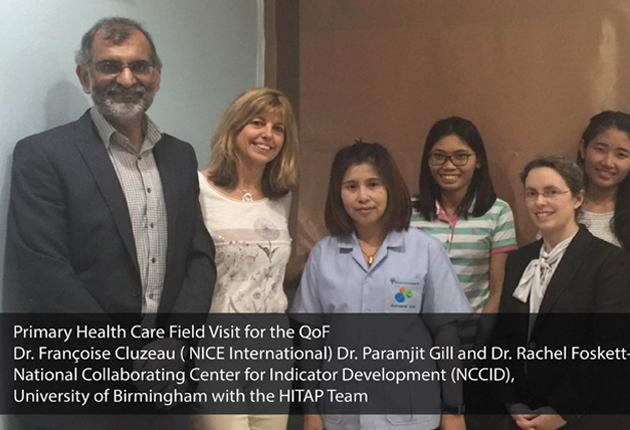Overcoming Barriers: Financing and Service Delivery for Vaccination in Fragile and Conflict-Affected States


Quality and Outcomes Framework Steering Meeting 15 March 2016
Thailand adopted in 2013 the Quality and Outcomes Framework, also known as the QOF. This program was initiated by the National Health Security Office (NHSO) in Thailand that is responsible for purchasing health care services for the Universal Health Coverage Scheme. The main goal of the QOF program was to strengthen the quality of primary health care by introducing financial incentives and quality indicators for measuring health care service performances. This means that when health professionals adhere to the quality indicators, they will receive more points which will be translated into a monetary reward. One year after the implementation of the QOF program, several issues were raised by both health care workers at the micro-level as well as managers at the meso- and macro-level. The raised concerns were related to both the program formulation as well as its implementation.
Barriers for the QOF program formulation were for instance, absence of a separate budget source, as the current QOF budget is being earmarked from the ambulatory service budget. Furthermore, the developed indicators were not evidence based, did not involve key stakeholder participation, and were not piloted. Also, the lack of cooperation between the Ministry of Public Health and the NHSO resulted in incompatibility in policies which resulted in a burden for health workers in the primary care sector. Issues related to the QOF implementation were for instance, insufficient communication which includes, absence of a feedback loop regarding the submitted data and time frame; and not allocating the budget in accordance with the QOF score.
As a result of these concerns, HITAP was requested by the NHSO to develop a method for developing indicators as well as drawing recommendations on QOF management. A new set of indicators was developed by using a scientific approach with the support of Thai health system experts and QOF experts from the UK. First, the main health problems in Thailand were identified and prioritized, then different stakeholders were invited to validate the priority list with health problems. Eventually, the steering committee decided on the final priority list of health problems. Based on this list, the research team developed indicators by using medical guidelines, which were presented during a stakeholder consultation meeting for another round of validation and verification. After that, the indicators were piloted in 37 primary care units in four provinces in order to assess their feasibility, reliability and validity. Finally, the results of the pilot were presented to the QOF steering committee. Based on the results, the indicators related to hypertension, diabetes mellitus, mother- and childcare and rational use of antibiotics were selected into the final indicator set. These newly developed set of indicators will be considered, by the NHSO board, for implementation in the upcoming year.
Many lessons can be derived from the establishment of the QOF program in Thailand. For instance, it is highly recommended to have an indicator development process that is evidence-based and done in a systematic and transparent manner. This also includes the involvement of key stakeholders in order to test for the indicator’s validity. Another lesson learned regarding the QOF implementation is that it should have a separate budget and be managed centrally. Furthermore, indicators should be kept for at least three years and should have clear payment criteria. Also, more efforts should be put in effective communication between policy makers, program managers and practitioners in terms of having a timely feedback and to provide an appropriate time frame. Lastly, a monitoring and evaluation system should be established to continuously improve the QOF program and prevent negative consequences such as neglecting tasks that are not incentivized by the QOF. Admitting that no definite conclusions can be drawn yet as the QOF program has been implemented only recently, it should be said that the QOF in Thailand is a promising intervention despite its many challenges.